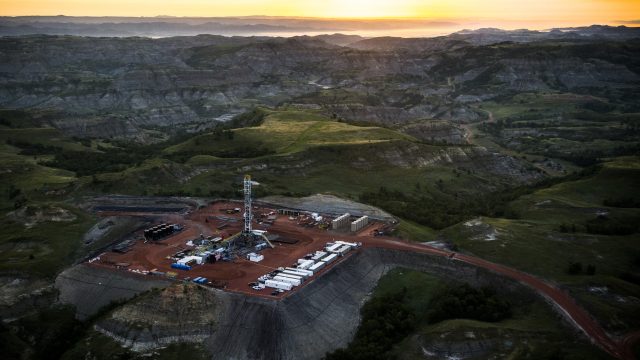"Necessity teaches the naked woman how to knit"

WATFORD CITY, ND - JULY 30: An oil drilling rig is seen in an aerial view in the early morning hours of July 30, 2013 near Watford City, North Dakota. The state has seen a boom in oil production thanks to new drilling techniques including horizontal drilling and hydraulic fracturing. (Photo by Andrew Burton/Getty Images)
“There’s a proverb in Norway that says necessity teaches the naked woman how to knit,” said Bjorn Otto Sverdrup, an executive with Statoil, told the New York Times by way of explaining the ways oil companies are finding new efficiencies to offset the impacts of low oil prices.
Case in point:
In the case of Whiting Petroleum’s Bakken shale holdings in North Dakota, new speed controls on its well pumps reduced equipment repair downtime by 48 percent and helped increase productivity of its wells by 28 percent in recent months.
“Our industry is very slow to adapt to change, so these shake-ups can be good for challenging operators to find better ways to do things,” said Ron Holsey, GE Oil & Gas’s general manager for automatization and optimization.
Another:
Statoil is testing new ways to drill and complete wells more efficiently, including replacing diesel for power with natural gas coming from the same field. It is also testing ways to reduce shipments of sand and water in hydraulic fracturing that break and keep open fissures in shale rocks so oil can ooze out. One way is to use bubbly liquefied carbon dioxide to replace some of the water in hydraulic fracturing, a technique Statoil will test this summer in North Dakota.
“These things we are working on are everlasting,” said Bill Maloney, another Statoil executive told the Times, “because the perfect well doesn’t go away when the price of oil goes back up.”
That’s a powerful point. When oil prices recover, these newly discovered efficiencies are going to persist making the industry more profitable and nimble than before.
Those are good things! Despite what the anti-fossil fuel activists would have us believe, oil and coal are what our economy runs on. Americans expect to be able to power up all their devices and heat their homes and drive thousands and thousands of miles per year all at prices they can afford.
We can’t do that without oil and coal. So every time we find more oil and coal, every time we get better at developing and using those resources more efficiently, we add a bit more security to the way of life we’ve become accustomed to.
And just imagine what the oil and coal industries would be capable of if they weren’t operating in such a politically hostile environment.
Meanwhile, how are communities in the center of the oil patch feeling about things? Well, pretty confident if this recent video put out by the folks in Williston tells us anything:




